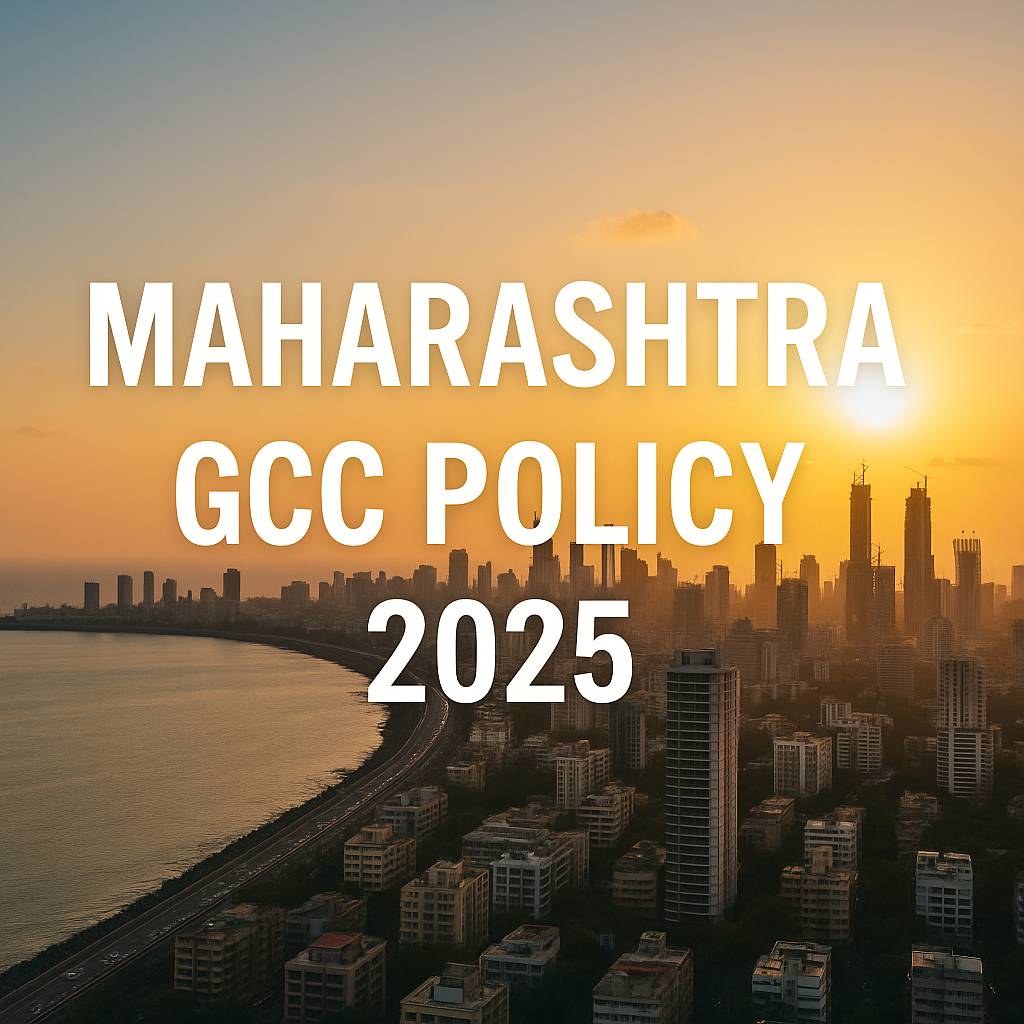The Rise of Global Capability Centres in India
Global Capability Centres (GCCs) are offshore units established by multinational corporations to manage strategic functions such as technology development, analytics, finance, R&D, and innovation for their global operations. Over the years, they have evolved from cost-efficient back-office setups into high-value centres of excellence that drive digital transformation, product innovation, and enterprise agility.
India has emerged as the global hub for GCCs, hosting over 1,600 centres employing more than 1.6 million professionals. With its strong talent base, technological depth, cost advantage, and innovation ecosystem, the country delivers advanced capabilities in AI, data engineering, cybersecurity, product design, and finance transformation.
Building on this momentum, the Government of Maharashtra has introduced the Maharashtra Global Capability Centre (GCC) Policy 2025, a progressive framework designed to position the state as a global leader in technology-driven business services. Through targeted incentives, infrastructure development, and investor facilitation, the policy aims to reinforce India’s leadership in the global GCC landscape.
Policy Vision and Strategy

The Maharashtra GCC Policy 2025 is designed to position the state at the forefront of India’s transformation into a knowledge-driven, innovation-led economy. Aligned with the national vision of Viksit Bharat @2047, which envisions India as a developed $30 trillion economy by 2047, the policy recognizes GCCs as engines of high-value employment, knowledge creation, and technological advancement.
Maharashtra’s strategy focuses on attracting global investments, fostering sector-specific GCC clusters, and extending growth beyond metros to Tier-2 and Tier-3 cities such as Nashik, Nagpur, and Chhatrapati Sambhajinagar. Leveraging its strong industrial base, skilled talent pool, robust IT ecosystem, and superior infrastructure, the state aims to strengthen Mumbai and Pune’s position as global service hubs while ensuring balanced regional development.
Through a mix of fiscal incentives, digital infrastructure, and streamlined governance, Maharashtra seeks to create a globally competitive environment that accelerates innovation, sustainability, and inclusive growth.
Key Objectives of the GCC Policy
The policy sets forth a clear and measurable roadmap to position Maharashtra as the most attractive destination for global companies establishing GCCs. Its primary objectives include:
- Attracting around 400 new GCCs across diverse sectors and service domains.
- Creating approximately 4 lakh high-skilled jobs through industry-academia partnerships, upskilling programs, and research collaborations.
- Fostering multinational collaborations to encourage GCC-led research, innovation, and knowledge transfer.
- Developing a digital databank to map talent, infrastructure, and connectivity, enabling investors to make informed location choices.
- Promoting Tier-2 and Tier-3 cities such as Nashik, Nagpur, and Chhatrapati Sambhajinagar as new economic hubs, thereby ensuring balanced and inclusive growth.
These objectives are underpinned by Maharashtra’s broader strategy to transition from a manufacturing-led to a knowledge-driven economy.
Focus Sectors and Cluster-Based Development Model
To optimize efficiency and encourage specialization, the Maharashtra GCC Policy 2025 promotes the cluster-based development model. By creating sector-specific GCC clusters, the state intends to provide companies with access to domain-specific infrastructure, research facilities, and skilled manpower, all within well-planned business ecosystems.
The policy identifies several priority sectors with strong global potential:
- Aerospace & Defence
- Agro & Food Processing
- Gems & Jewellery
- Logistics and Supply Chain
- Metals & Mining
- Pharmaceuticals & Chemicals
- Renewable and Green Energy
- Textiles & Apparel
- IT/ITES and Automotive
Each cluster will be supported by targeted skilling programs, technology partnerships, and institutional linkages. The convergence of digital capabilities, research institutions, and specialized infrastructure is expected to enhance productivity, reduce costs, and enable global companies to achieve operational excellence.
This approach also ensures synergy with other state and central policies such as the Industrial Policy 2024, IT/ITES Policy, and Logistics Policy 2023, reinforcing Maharashtra’s leadership in innovation-driven industrialization.
Incentive Framework: Fiscal and Non-Fiscal Support
- Fiscal Incentives: The policy introduces a comprehensive fiscal support framework designed to reduce project setup costs, operating expenses, and capital risk. Key fiscal incentives include:
- Capital Subsidy or Rental Assistance: Financial support for infrastructure development or leasing of office premises.
- Payroll and Interest Subsidy: Reimbursement of a portion of employee payroll and interest on term loans to enhance operational liquidity.
- Incentives on Incremental Investment: Rewards for continued capital expansion and technology upgrades.
- Patent Filing Assistance and Green Certification: Support to promote innovation and sustainable operations.
- Power Tariff Subsidy and Duty Exemption: Reduction in energy costs and exemption from electricity duty.
- R&D Grants and Internship Programs under CMYKPY: Funding for research projects and internship support for talent development.
- Stamp Duty and Property Tax Exemptions: Reducing entry barriers for GCC setup.
- Non-Fiscal Incentives: Equally significant are the non-fiscal incentives, which ensure a seamless business environment and long-term policy stability. These include:
- Industry Status to GCCs, allowing them to access industrial benefits typically reserved for manufacturing sectors.
- Additional Floor Space Index (FSI) and Mixed-Use Permissions, enabling flexible facility development.
- Reserved MIDC Land and Priority Allotment, ensuring quick access to prime business locations.
- Ease of Doing Business (EoDB) Reforms, including streamlined approvals and single-window clearances.
- Digital Data Repository and Open Access, allowing data-driven decision-making for new entrants.
- Assured Power and Water Supply, supporting 24×7 operational continuity.
- Flexible Employment Conditions, permitting round-the-clock operations and global workforce management.
Together, these incentives create a competitive ecosystem where global enterprises can establish and scale operations efficiently.
Infrastructure and Digital Readiness
The policy envisions the creation of world-class business districts with integrated physical and digital infrastructure. By leveraging Maharashtra’s well-developed transport networks, data centres, and communication backbone, the state aims to provide an environment conducive to advanced technological operations.
A core feature of the policy is the establishment of a Digital Databank, a centralized digital platform mapping talent availability, connectivity, and real estate options across cities. This will allow investors to make informed site-selection decisions.
Moreover, the policy encourages the development of AI and Machine Learning Centres of Excellence (CoEs) to drive R&D and innovation across industries, further strengthening Maharashtra’s position as a smart, data-driven economy.
Projected Economic Impact and Investment Potential
According to the government’s projections, the Maharashtra GCC Policy 2025 is expected to attract investments worth approximately ₹50,600 crore and generate nearly 4 lakh new high-skilled jobs across the state.
Beyond immediate employment, the policy will have a multiplier effect, stimulating ancillary industries in IT services, commercial real estate, fintech, cybersecurity, and logistics. By expanding GCC presence beyond Mumbai and Pune, it will foster regional balance, bringing prosperity to emerging urban centres while reducing migration pressure on metro cities.
In the long run, the GCC ecosystem will contribute significantly to Maharashtra’s Gross State Value Added (GSVA) and strengthen its global competitiveness in the digital economy.
Policy Synergies and Implementation Framework
The policy integrates seamlessly with key national initiatives such as Digital India, Startup India, Make in India, and the National AI Mission. It also aligns with state policies on Industrial Promotion, IT/ITES, and Logistics, creating an interconnected policy environment that supports holistic growth.
Institutional execution will be led by MIDC (Maharashtra Industrial Development Corporation), Invest Maharashtra, and dedicated EoDB task forces, ensuring investor-friendly governance and time-bound approvals.
Implications for Investors and Corporates
For multinational corporations and large Indian enterprises, Maharashtra presents an unmatched value proposition for GCC establishment. Key benefits include:
- Access to one of India’s deepest pools of digital and engineering talent.
- Lower operational costs due to attractive fiscal incentives and infrastructure readiness.
- Strategic location advantage with proximity to financial markets, ports, and global connectivity.
- Supportive government facilitation through proactive single-window clearances.
- Robust ecosystem for AI, data analytics, and digital transformation services.
The policy encourages enterprises in IT, BFSI, automotive, healthcare, and renewable energy to leverage Maharashtra as their strategic global operations base, driving both cost efficiency and innovation.
Maharashtra’s Global Leap Toward Innovation Leadership
The Maharashtra GCC Policy 2025 represents a bold and visionary step towards making the state a global epicentre for technology, innovation, and digital business excellence. By combining infrastructure readiness, forward-looking incentives, and inclusive development, Maharashtra is laying the foundation for the next phase of India’s economic transformation.
As global enterprises seek resilient, cost-effective, and talent-rich destinations, Maharashtra’s GCC ecosystem, powered by strategic policy support, will define the future of innovation-driven growth in India.
How can we help?
As a consulting partner with expertise across industrial policy and investment advisory, we help investors and corporates leverage the Maharashtra GCC Policy 2025 by providing end-to-end advisory across feasibility, incentives, and implementation, delivering strategic, data-driven outcomes.
